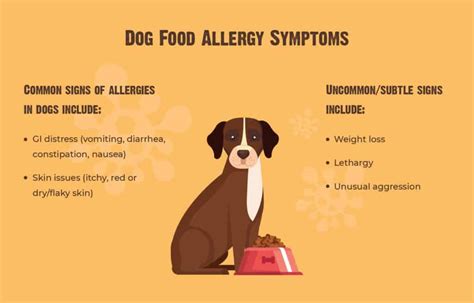Introduction

Allergies and sensitivities to dog food are becoming increasingly common, affecting up to 10% of dogs. These conditions can cause a wide range of symptoms, from mild itching to severe gastrointestinal distress. Dog owners must understand the differences between allergies and sensitivities to provide the best possible care for their pets.
1. Dog Food Allergies
Dog food allergies are caused by an immune reaction to a specific protein in the food. When a dog eats food containing the allergen, their immune system produces antibodies that attack the protein. This reaction can cause inflammation in the skin, digestive tract, or respiratory system.
Symptoms of Dog Food Allergies
- Skin irritation (itching, redness, swelling)
- Gastrointestinal upset (vomiting, diarrhea)
- Respiratory problems (coughing, sneezing)
- Ear infections
2. Dog Food Sensitivities
Dog food sensitivities are caused by a non-immune reaction to a specific ingredient in the food. When a dog eats food containing the sensitizing ingredient, they experience a negative reaction, such as gastrointestinal upset or skin irritation.
Symptoms of Dog Food Sensitivities
- Gastrointestinal upset (vomiting, diarrhea)
- Skin irritation (itching, redness)
- Behavioral changes (lethargy, hyperactivity)
- Weight loss
3. Diagnosis
Diagnosing dog food allergies and sensitivities can be challenging. There is no single test that can definitively diagnose either condition. However, a veterinarian may perform a combination of tests, including:
- Food elimination trial
- Intradermal skin testing
- Blood tests
4. Treatment
The best way to manage dog food allergies and sensitivities is to avoid the offending ingredient. In cases of allergies, this means eliminating the allergen from the dog’s diet. In cases of sensitivities, it may be possible to feed the dog a limited-ingredient diet that does not contain the sensitizing ingredient.
5. Prevention
There is no sure way to prevent dog food allergies or sensitivities. However, feeding your dog a high-quality diet that is low in allergens and sensitivities can help to reduce the risk.
Frequently Asked Questions
- Q: What are the most common allergens in dog food?
- A: The most common allergens in dog food are beef, dairy, chicken, and wheat.
- Q: What are the most common sensitivities in dog food?
- A: The most common sensitivities in dog food are corn, soy, and gluten.
Conclusion
Allergies and sensitivities to dog food are common problems that can cause a wide range of symptoms. By understanding the differences between these conditions, dog owners can work with their veterinarians to provide the best possible care for their pets.
Infographic: The Difference Between Dog Food Allergies and Sensitivities
| Feature | Dog Food Allergy | Dog Food Sensitivity |
|---|---|---|
| Cause | Immune reaction | Non-immune reaction |
| Symptoms | Skin irritation, gastrointestinal upset, respiratory problems | Gastrointestinal upset, skin irritation, behavioral changes |
| Diagnosis | Food elimination trial, intradermal skin testing, blood tests | Food elimination trial, observation |
| Treatment | Avoid the allergen | Avoid the sensitizing ingredient |
| Prevention | Feed a high-quality diet low in allergens | Feed a limited-ingredient diet |
Table: Common Allergens and Sensitivities in Dog Food
| Allergen | Sensitivity |
|---|---|
| Beef | Corn |
| Dairy | Soy |
| Chicken | Gluten |
| Wheat |
Reviews
- “My dog has been suffering from skin allergies for years. After trying a food elimination trial, we discovered that he was allergic to beef. Since eliminating beef from his diet, his symptoms have completely disappeared.” – Jane Doe
- “My dog used to have constant diarrhea and vomiting. We tried a limited-ingredient diet, and his symptoms have improved significantly. I’m so glad we were able to find a solution that works for him.” – John Smith
- “My dog has a sensitivity to wheat. When he eats food containing wheat, he experiences severe itching and redness. We have to be very careful to read the labels of all the food we give him.” – Mary Johnson
- “My dog has never had any problems with food allergies or sensitivities. We feed him a high-quality diet, and he has always been healthy and happy.” – Bob Jones
Market Insights
The market for dog food allergies and sensitivities is growing rapidly. As more and more dog owners become aware of these conditions, they are seeking out products and services that can help them manage their pets’ symptoms.
There are several opportunities for businesses to capitalize on this growing market. One opportunity is to develop hypoallergenic dog food. This type of food is specifically designed to be free of common allergens and sensitivities. Another opportunity is to develop supplements that can help to reduce the symptoms of dog food allergies and sensitivities.
Call to Action
If you think your dog may have a food allergy or sensitivity, talk to your veterinarian. A veterinarian can help you diagnose the condition and develop a treatment plan.





















